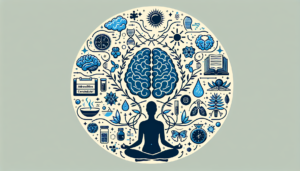Ultimate Stress Relief: Tips for a Calmer Mind
Stress is a natural response to the demands and pressures of life. It can manifest in various forms, from mild anxiety to overwhelming feelings of dread. When we encounter a stressful situation, our bodies react with a “fight or flight” response, releasing hormones like adrenaline and cortisol.
While this reaction can be beneficial in short bursts—helping us to react quickly in dangerous situations—chronic stress can lead to significant mental health issues. Prolonged exposure to stress can contribute to anxiety disorders, depression, and even cognitive decline. Understanding how stress affects our minds is crucial for developing effective strategies to manage it.
The impact of stress on mental health is profound. It can cloud our judgment, impair our memory, and diminish our ability to concentrate. When we are under stress, our brains may struggle to process information effectively, leading to feelings of confusion and frustration.
Additionally, stress can create a cycle of negative thinking, where worries about the future or regrets about the past consume our thoughts. This cycle can be difficult to break, making it essential to recognize the signs of stress early and take proactive steps to mitigate its effects. Check out the Zestifica 5-HTP Supplement for a natural way to support your mood and overall well-being.
Key Takeaways
- Stress can have a significant impact on the mind, leading to anxiety, depression, and other mental health issues.
- Identifying triggers and sources of stress is crucial in managing and reducing its impact on mental well-being.
- Incorporating relaxation techniques into daily routine, such as deep breathing and progressive muscle relaxation, can help alleviate stress.
- Mindfulness and meditation have the power to calm the mind, reduce stress, and improve overall mental health.
- Prioritizing self-care and setting boundaries is essential for maintaining mental well-being and managing stress levels.
Identifying Triggers and Sources of Stress
External Stressors
External stressors can include work deadlines, family responsibilities, or financial concerns. These stressors often stem from external circumstances that can be challenging to navigate.
Internal Stressors
Internal stressors, on the other hand, can include self-doubt and perfectionism. These stressors often arise from negative thought patterns and self-criticism.
Taking Control of Stress
Once you’ve identified your stress triggers, you can begin to develop ways to address them. This might involve keeping a journal to track your feelings and identify patterns, discussing your workload with your supervisor, or seeking support from colleagues. By understanding the sources of your stress, you can take control of your situation and feel more empowered to manage your stress.
Incorporating Relaxation Techniques into Daily Routine

Another effective technique is visualization, where you imagine a peaceful scene or a place where you feel safe and relaxed. This mental escape can provide a much-needed break from the chaos of daily life. Additionally, consider setting aside time each day for activities that bring you joy, whether it’s reading a book, taking a walk in nature, or enjoying a warm bath.
These moments of self-care not only help reduce stress but also enhance your overall well-being.
The Power of Mindfulness and Meditation
| Benefits of Mindfulness and Meditation | Statistics |
|---|---|
| Stress Reduction | 76% of people practicing mindfulness and meditation reported reduced stress levels |
| Improved Focus | Research shows that mindfulness and meditation can improve attention and concentration |
| Enhanced Emotional Well-being | Studies have found that mindfulness and meditation can reduce symptoms of anxiety and depression |
| Physical Health Benefits | Regular meditation has been linked to lower blood pressure and improved immune function |
| Increased Productivity | Employees who practice mindfulness at work reported a 28% increase in productivity |
Mindfulness and meditation are powerful tools for managing stress and enhancing mental clarity. Mindfulness involves being fully present in the moment without judgment, allowing you to observe your thoughts and feelings without becoming overwhelmed by them. Practicing mindfulness can help you develop a greater awareness of your stress triggers and how they affect you emotionally and physically.
Meditation takes mindfulness a step further by providing structured techniques for calming the mind. Regular meditation practice has been shown to reduce anxiety and improve emotional regulation. Even just a few minutes of meditation each day can create a sense of peace and help you cultivate resilience against stressors.
There are many forms of meditation—such as guided meditation, loving-kindness meditation, or body scan techniques—so you can find one that resonates with you. The key is consistency; making meditation a regular part of your routine can lead to lasting benefits.
Prioritizing Self-Care and Setting Boundaries
Self-care is not just a buzzword; it’s an essential component of maintaining mental health and managing stress effectively. Prioritizing self-care means recognizing your own needs and making time for activities that nourish your body and mind. This could include regular exercise, healthy eating, adequate sleep, or simply taking time out for hobbies that bring you joy.
Setting boundaries is equally important in the realm of self-care. It’s easy to become overwhelmed when we say yes to every request or obligation that comes our way. Learning to say no when necessary is a vital skill that protects your time and energy.
By establishing clear boundaries with work, family, and friends, you create space for yourself to recharge and focus on what truly matters. Remember that taking care of yourself is not selfish; it’s essential for being able to support others effectively.
Creating a Supportive and Positive Environment

The environment we inhabit plays a significant role in our mental well-being. A supportive and positive environment can help mitigate stress and foster resilience. Surrounding yourself with uplifting people who encourage and inspire you can make a world of difference in how you cope with challenges.
Seek out relationships that are nurturing rather than draining; these connections can provide comfort during tough times. Additionally, consider the physical space around you. A cluttered or chaotic environment can contribute to feelings of stress and overwhelm.
Taking time to organize your living or working space can create a more calming atmosphere. Incorporating elements like plants, soothing colors, or personal mementos can also enhance your environment’s positivity. Creating a sanctuary where you feel safe and at ease is an important step toward managing stress effectively.
Seeking Professional Help and Counseling
Sometimes, despite our best efforts, stress can become unmanageable. In such cases, seeking professional help is not only wise but necessary. Mental health professionals—such as therapists or counselors—can provide valuable support and guidance tailored to your specific needs.
They can help you explore underlying issues contributing to your stress and teach coping strategies that may not have occurred to you. Therapy offers a safe space to express your feelings without judgment while gaining insights into your thought patterns and behaviors. Whether through cognitive-behavioral therapy (CBT), talk therapy, or other modalities, professional support can empower you to navigate life’s challenges more effectively.
Remember that seeking help is a sign of strength; it shows that you are committed to taking care of yourself and improving your mental health.
Developing Healthy Coping Mechanisms for Long-Term Stress Relief
Developing healthy coping mechanisms is crucial for long-term stress relief. Instead of turning to unhealthy habits like excessive drinking or binge eating when faced with stress, consider healthier alternatives that promote well-being. Engaging in physical activity—whether it’s going for a run, practicing yoga, or dancing—can release endorphins that boost your mood and reduce stress levels.
Creative outlets such as painting, writing, or playing music can also serve as effective coping mechanisms. These activities allow for self-expression and provide an opportunity to channel emotions constructively. Additionally, building a routine that includes regular social interactions—whether through friends, family gatherings, or community events—can foster connection and support during stressful times.
In conclusion, managing stress is an ongoing journey that requires awareness, intention, and practice.
By understanding the nature of stress and its effects on the mind, identifying triggers, incorporating relaxation techniques into daily life, embracing mindfulness practices, prioritizing self-care, creating supportive environments, seeking professional help when needed, and developing healthy coping mechanisms, you can cultivate resilience against life’s challenges.
Remember that it’s okay to ask for help along the way; taking steps toward better mental health is always worth it.
If you’re looking for ways to reduce stress and improve your overall well-being, consider exploring the benefits of mobility support for seniors.
This article discusses how maintaining mobility can lead to a healthier and more active lifestyle, ultimately reducing stress levels. Check out the full article here for more information on how mobility support can help you manage stress effectively.
Shop Stress Relief Supplements
FAQs
What is stress relief?
Stress relief refers to the techniques and activities that help to reduce or manage the physical, mental, and emotional effects of stress. These can include relaxation exercises, mindfulness practices, physical activity, and seeking social support.
Why is stress relief important?
Chronic stress can have negative effects on both physical and mental health, including increased risk of heart disease, depression, and anxiety. Finding effective ways to manage and reduce stress can help improve overall well-being and quality of life.
What are some common stress relief techniques?
Common stress relief techniques include deep breathing exercises, meditation, yoga, tai chi, progressive muscle relaxation, spending time in nature, engaging in hobbies, and seeking support from friends and family.
How does exercise help with stress relief?
Exercise has been shown to release endorphins, which are natural mood lifters. Physical activity can also help to reduce muscle tension and improve sleep, both of which can contribute to stress reduction.
Can stress relief techniques be effective for everyone?
While many stress relief techniques can be effective for most people, individual responses to stress relief methods can vary. It’s important to find the techniques that work best for you and to seek professional help if you are struggling to manage stress on your own.








